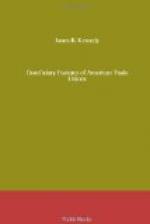The history of the travelling benefit in the Cigar Makers’ Union begins almost with the earliest years of the Union. Prior to the Detroit convention, September, 1873, the Union maintained a system of loans to travelling craftsmen. Under this system any member, travelling in search of employment, was entitled to a loan sufficient to transport him to the nearest union. The local union in which the travelling member secured employment was required to collect at least twenty per cent. of the weekly wages of such member.[185] This first attempt was an absolute failure and in 1878 the system was abolished.[186] In October, 1878, local union No. 122 proposed an amendment to the international constitution to provide means of aiding “all travelling craftsmen in need.” The aid was not to be a loan but an absolute gift.[187] This proposal failed of adoption; but in August, 1879, local union no. 144 proposed a new plan.[188] A member of six months’ standing, if unemployed, was to be loaned a sufficient sum to transport him by the cheapest route to the nearest union and so to the next. The total of the loans was not to aggregate more than twenty dollars.[189] The plan was adopted and became effective May 1, 1880. In 1884 the amount of any one loan was limited to twelve dollars, and in 1896 it was farther reduced to eight dollars.[190]
[Footnote 185: Constitution, 1867, Art. 11.]
[Footnote 186: Cigar Makers’ Journal, Vol. 1, October 5, 1878, p. 3.]
[Footnote 187: Ibid.]
[Footnote 188: Ibid. Vol. 4, August, 1879, p. 2.]
[Footnote 189: Constitution, 1880 (New York, 1880), Art. 4.]
[Footnote 190: Constitution, 1884 (New York, 1884), Art. 7; 1896, fourteenth edition, (Chicago, n.d.), p. 27. (Issued in 1906.)]
The Cigar Makers have always required members to return the sum borrowed. The repayment of such loans, in the case of the Cigar Makers’ Union, must commence with the first week of employment, and must continue at the rate of ten per cent. of the weekly earnings.[191] The Brotherhood of Leather Workers on Horse Goods require payment at the rate of fifteen per cent. of weekly wages.[192] The German-American Printers, on the other hand, grant travelling loans as an absolute gift.[193] This is the only important union which follows this policy.
[Footnote 191: Constitution, 1880 (New York, 1880), Art. 4; 1896, thirteenth edition, (Chicago, n.d.), p. 28.]
[Footnote 192: Constitution, 1904 (Kansas City, n.d.), p. 21.]
[Footnote 193: Report of Industrial Commission, Vol. 17, Introduction, p. XLII.]




